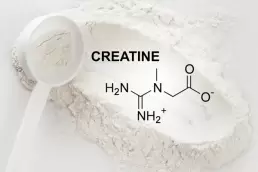Creatine Monohydrate: What It Is and Why You Should Consider Taking It
When it comes to supplements that deliver real results in performance, strength, and overall fitness, creatine monohydrate stands at the top of the list. Whether you’re new to the gym or a seasoned athlete, you’ve likely heard of creatine. But what exactly is it, and should you be considering it as part of your routine?
Let’s dive into why this supplement is highly recommended and how it could be the missing piece in your training.
What is Creatine Monohydrate?
Creatine is a natural substance found in muscle cells, playing a key role in producing energy during high-intensity exercise. Creatine monohydrate is the most researched and widely used form of creatine supplementation. It’s naturally occurring in foods like meat and fish, but the amount you’d need to consume to match the benefits of a supplement would be quite high.
By supplementing with creatine monohydrate, you’re ensuring that your body has an optimal supply of this energy-boosting compound to enhance your workouts and recovery.
The Benefits of Creatine Monohydrate
- Increased Strength and Power. If you’re looking to lift heavier, run faster, or just improve overall athletic performance, creatine can help. By increasing the availability of ATP (your body’s energy currency), creatine provides that extra push during intense exercise, leading to strength gains and better performance in both anaerobic and aerobic activities.
- Improved Muscle Mass. Creatine helps with muscle volumization—meaning your muscles retain water, making them appear fuller and more defined. But beyond the aesthetics, it also supports muscle growth by increasing workload capacity, helping you push through those extra reps that lead to gains.
- Better Recovery. One of the underrated benefits of creatine is its role in muscle recovery. Creatine helps reduce muscle cell damage and inflammation following intense exercise, allowing you to bounce back quicker from hard training sessions.
- Enhanced Brain Function. Creatine isn’t just for the body; it can also benefit the brain. Studies have shown it can improve cognitive function, particularly in tasks requiring short-term memory and quick thinking. This can be a great bonus, especially if you’re a busy professional trying to juggle work, family, and fitness.
- Convenient and Safe. Unlike some supplements that come with long lists of side effects, creatine monohydrate is one of the safest and most studied supplements available. It’s easy to use—just mix it into water or your favorite drink—and you’re good to go. It’s also very affordable, making it a great value for what it delivers.
How to Take Creatine Monohydrate
Unlike some supplements that require complex dosing strategies, there’s no need to “load” creatine by taking a high amount at first.
You can start with the recommended daily dose of 3-5 grams per day from the beginning. Taking this amount consistently will raise your creatine stores in your muscles over time, and you’ll start seeing the benefits without the need for a loading phase.
You can take creatine at any time of the day, although many people find it easiest to take post-workout or mixed into a shake.
Who Should Consider Taking Creatine?
- Strength and power athletes: If you’re into weightlifting, sprinting, or any high-intensity activity, creatine can help you improve performance and get stronger.
- Endurance athletes: Creatine isn’t just for power; it can also enhance recovery, helping endurance athletes push harder in training and recover faster between sessions.
- Busy professionals or parents: Creatine supports both mental and physical energy, helping you stay sharp and focused through your workouts—and your hectic day-to-day life.
- Anyone looking to improve body composition: If you’re aiming to lose fat while building muscle, creatine helps preserve muscle mass during periods of caloric deficit.
Final Thoughts
Creatine monohydrate is a solid addition to your supplement routine, especially if your goals include building strength, improving recovery, or boosting overall performance. It’s backed by science, affordable, and safe for long-term use.
In the accompanying video, I’ll walk you through my personal recommendation on when and how to take creatine, and how it’s worked for both myself and my clients. As always, it’s important to listen to your body and consider consulting with a healthcare provider before adding any supplement to your routine.
Feel free to reach out if you have any questions or want help dialing in your nutrition and supplement strategy!
Fitter, Faster, Stronger.
1% Better.
Luke
Your Coach for Health & Performance
